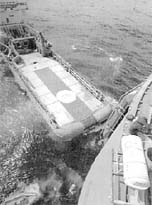Documenting dissent
 AFTER Rachel Carson's passionate polemic Silent Spring was published in 1962, environmentalism in the West assumed urgency and a sense of purpose. The pervasive popularity of this particular philosophy has transformed Western society through legislation, popular pressure, and individual initiatives. Although transparent and virtually inflexible procedures for safeguarding the environment are now well established, environmentalism continues to face newer challenges accompanying the inexorable spread of commercial enterprise and technological transformation. The book, Decommissioning the Brent Spar, is a fascinating story of one such challenge to the environment.
AFTER Rachel Carson's passionate polemic Silent Spring was published in 1962, environmentalism in the West assumed urgency and a sense of purpose. The pervasive popularity of this particular philosophy has transformed Western society through legislation, popular pressure, and individual initiatives. Although transparent and virtually inflexible procedures for safeguarding the environment are now well established, environmentalism continues to face newer challenges accompanying the inexorable spread of commercial enterprise and technological transformation. The book, Decommissioning the Brent Spar, is a fascinating story of one such challenge to the environment.
The Brent Spar, contrary to popular perception, was not an oil drilling rig. It was a simple oil storage tank, albeit of gigantic size, in the Brent oilfields of the North Sea. Built in 1976, as a buoy, the Brent Spar was owned and operated by the oil major Shell. The Brent Spar was used to store oil drilled from the nearby oil rigs before transfer to oil tankers. Weighing 14,500 tonnes, the Spar was 137 metres long and "resembled a vast bottle with a rather large cap.' The Spar could store within its bowels 300,000 barrels of oil.
The total oil storage capacity of the Spar was, however, never completely used. The Spar itself was used for a very short time as an undersea oil pipeline came up in 1978. In the wake of increasing maintenance costs and diminishing use and returns, Shell decided, in 1991, to get rid of the Spar by sinking it in the North Atlantic Ocean. Shell justified this mode of the Spar's disposal as the best practicable environmental option as determined by several internal studies. The British government, by 1995, had decided to permit this mode of the Spar's disposal.
Greenpeace, which got wind of the British government's impending approval to the Spar's deep-sea disposal, decided to protest. In typical Greenpeace fashion, a group of activists, some of whom were skilled Alpine climbers, clambered upon the Spar on April 30, 1995, and began their six-week, high profile occupation of the Brent Spar. For the coming several months the Brent Spar affair was set to dominate media attention in Europe. Greenpeace opposed the Spar's disposal in the deep-sea for several reasons: the presence of "nasty materials' on the Spar (hotly, and correctly, disputed by Shell); the inevitable creation of a precedent allowing future disposal of similar structures in the oilfields of North Sea; the belief that alternative, onshore disposal was a technically feasible option and, finally, the violation of several international laws that sinking the Spar would cause.
After weeks of dogged persistence, with endorsement from the British government, Shell capitulated on June 20, 1995
